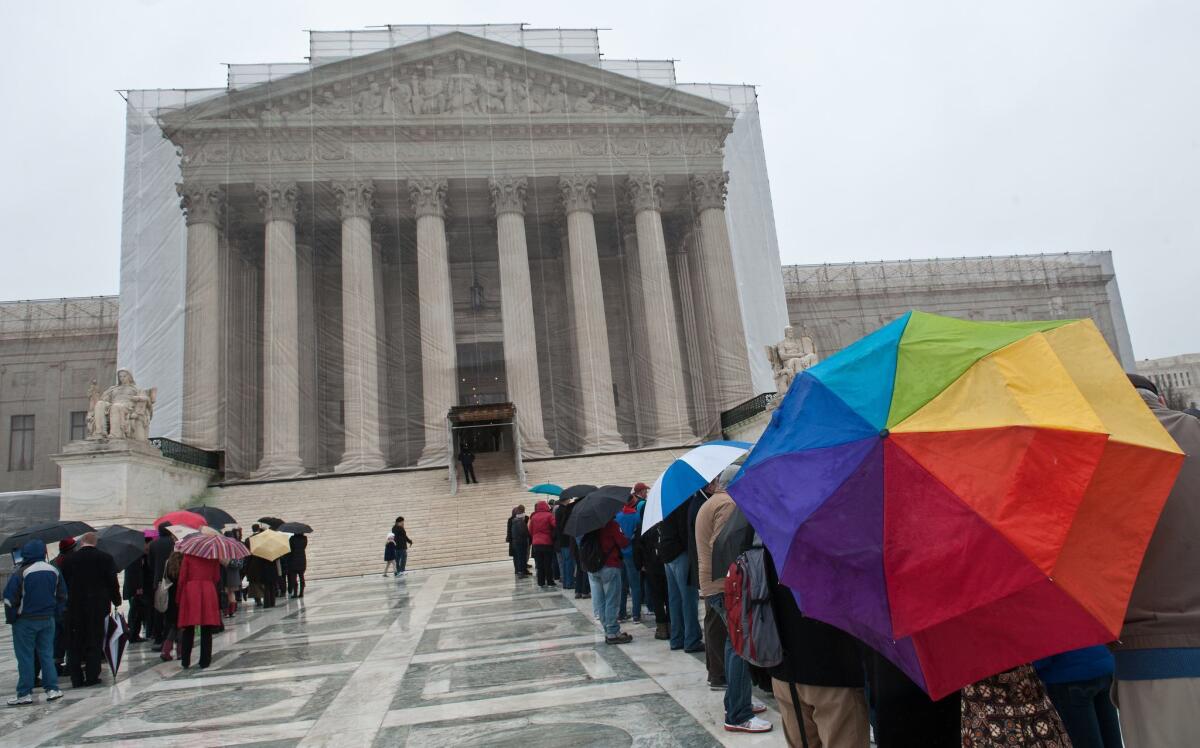As Supreme Court considers gay marriage, abortion comparisons rise

- Share via
Are gay marriage and abortion culturally equivalent?
As the U.S. Supreme Court prepares to take up one of the great civil rights issues of our day, many people wonder whether the court might move cautiously so as to avoid the social upheaval and spasms of violence unleashed by its famous 1973 decision legalizing abortion.
What a terrible mistake that would be.
Tuesday, we will get the chance to hear arguments in the California case over Prop. 8, which outlawed gay marriage in 2008. On Wednesday, the court will hear arguments over the federal Defense of Marriage Act. DOMA allows states to ignore gay marriages made in states where it is legal, and deprives same-sex spouses of all kinds of federal benefits, including Social Security survivor benefits and the right to file joint federal tax returns.
FULL COVERAGE: Same-sex marriage ban
No one knows what the court will do. “Those who know don’t talk. And those who talk don’t know,” Justice Ruth Bader Ginsburg joked in a speech last year, addressing the frenzy of speculation around how the court would rule on the Affordable Health Care Act.
We’re approaching the same kind of frenzy over the gay marriage issue.
And, once again, all we’ve got to go on is speculation.
MAP: Track rights for same-sex couples
Much of that has focused on whether the court, if it is inclined to enshrine civil rights for gays, might issue a very narrow decision -- say, strike down the California gay marriage ban as unconstitutional -- and leave the decision about whether to legalize gay marriage to the states where it isn’t legal yet.
In the tumultuous years since Roe vs. Wade, many legal experts -- including Ginsburg herself -- have posited that the court erred in 1973, and should not have made such a sweeping decision.
“It’s not that the judgment was wrong, but it moved too far, too fast,” Ginsburg said last year in a speech at Columbia University Law School. The New York Times examined this idea on Sunday.
Those in the “too much too soon” camp say the court inadvertently unleashed decades of tumult and violence with its ruling, and should have limited its decision to the narrow issue of whether the Texas law before them, which forbade abortion except to save the mother’s life, was constitutional. States, in that scenario, would have been allowed to gradually decide the issue of abortion.
But that position avoids the constitutional heart of the issue: Is it a woman’s absolute right to end a pregnancy in the early stages or not? If it is, the court certainly was correct in its ruling, regardless of the timing and political fallout.
I love Justice Ginsburg, but I think her theory is hogwash.
Also, this is not 1973, and gay marriage is not the same issue as abortion.
Abortion, necessarily, weighs the rights of the mother against the rights of the fetus growing inside her. It is a problem rife with ethical, moral and medical considerations.
There is no such balancing of rights in gay marriage, no damaged party in gay marriage, no ending of anything. Just a joyful beginning, an embrace of a socially valuable institution, and the recognition that all American citizens are equal under the Constitution.
The Supreme Court’s job is to protect the rights of the minority against tyranny by the majority. This is as good a time as any to test that eternal obligation.
Many have noted that the political fight over gay marriage is in its death throes. When a conservative Republican soldier such as Ohio Sen. Rob Portman embraces gay marriage -- gay son or not -- you know the tide has turned.
Today, in an essay in the Yale Daily News, Portman’s son, Will, wrote about the conflict he felt over coming out and how it would affect his father’s career: “I’m proud of my dad, not necessarily because of where he is now on marriage equality (although I’m pretty psyched about that), but because he’s been thoughtful and open-minded in how he’s approached the issue, and because he’s shown that he’s willing to take a political risk in order to take a principled stand.”
(The essay is worth reading for the anecdote about what happened when Will Portman came out to his high school best friend.)
As it turns out, Rob Portman is merely in step with the rest of his state.
In 2004, 62% of Ohio voters supported an amendment to their state constitution banning gay marriage. But in a new poll by the Columbus Dispatch, 54% of Ohio adults now say they support repealing the amendment and allowing gay couples to marry.
As we’ve heard ad nauseum on political talk shows, some 80% of young people support gay marriage, so if the Supreme Court fails to legalize it this year, it’s only a matter of time before all the states do. I am not so sure about that, but here’s the bigger question:
Why should the rights of any American have to wait for a bunch of kids to grow up? If it’s the right thing to do in a decade, it’s the right thing to do now.
ALSO:
No clear motive in slaying of East Hollywood man, police say
Man who set himself on fire in nail salon not expected to survive
Lesbian cousin of Supreme Court’s chief justice to attend Prop. 8 hearing
Email: robin.abcarian@latimes.com
Twitter: @robinabcarian
More to Read
Sign up for Essential California
The most important California stories and recommendations in your inbox every morning.
You may occasionally receive promotional content from the Los Angeles Times.











